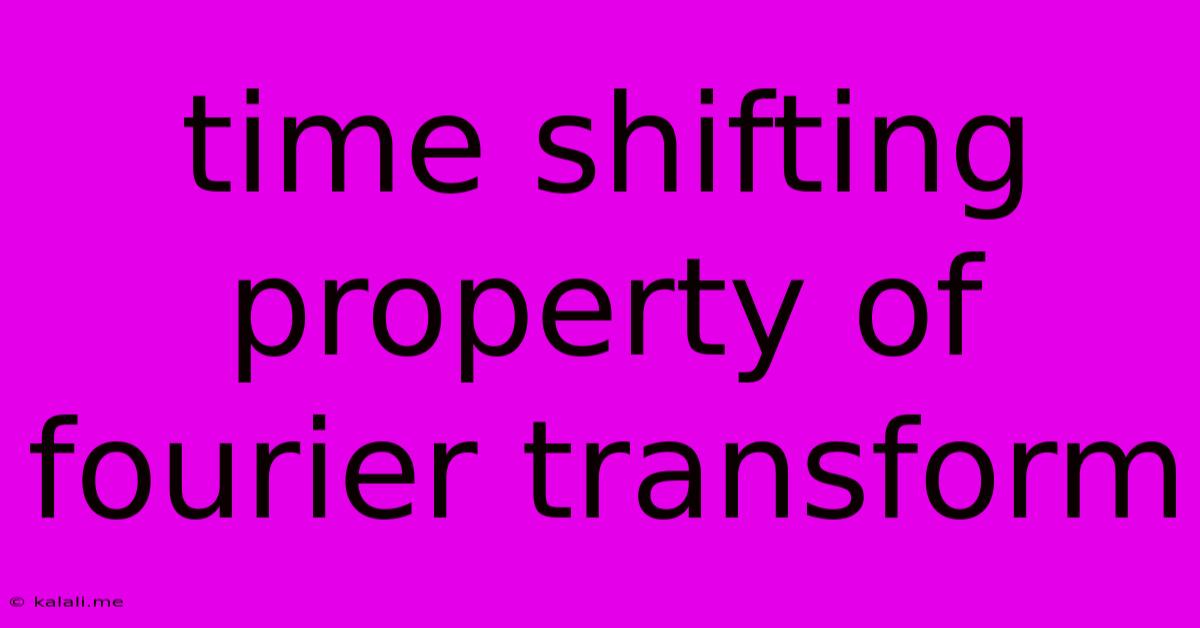Time Shifting Property Of Fourier Transform
Kalali
Jun 14, 2025 · 3 min read

Table of Contents
The Time-Shifting Property of the Fourier Transform: A Deep Dive
The Fourier Transform is a powerful mathematical tool used extensively in signal processing, image processing, and many other fields. Understanding its properties is crucial for effectively applying it. One particularly important property is the time-shifting property, which describes how a time shift in the input signal affects its Fourier Transform. This article will explore this property in detail, providing a clear understanding of its implications and practical applications. We'll delve into the mathematical representation, explore intuitive explanations, and examine its significance in various domains.
The time-shifting property states that a shift in the time domain results in a phase shift in the frequency domain. This means that if a signal is shifted in time, its Fourier Transform will remain unchanged in magnitude but will experience a change in its phase. This seemingly simple statement has profound implications for signal analysis and manipulation.
Mathematical Representation of the Time-Shifting Property
Let's denote a signal as x(t) and its Fourier Transform as X(f). The time-shifting property can be expressed mathematically as follows:
If x(t) has a Fourier Transform X(f), then the Fourier Transform of x(t - t₀) (the signal shifted by t₀) is given by:
F{x(t - t₀)} = e<sup>-j2πft₀</sup>X(f)
where:
- t₀ represents the time shift.
- j is the imaginary unit (√-1).
- f represents the frequency.
This equation shows that the shifted signal's Fourier Transform is simply the original Fourier Transform multiplied by a complex exponential term, e<sup>-j2πft₀</sup>. This complex exponential term introduces a phase shift that is dependent on both the frequency (f) and the time shift (t₀).
Intuitive Understanding of the Time-Shifting Property
Imagine a simple sine wave. If you shift this sine wave to the right or left along the time axis, the overall shape of the wave doesn't change – it’s still a sine wave with the same frequency and amplitude. However, its starting point in time has changed. This change in the starting point is reflected in the phase shift in the frequency domain. The frequency content remains the same, but the phase of each frequency component is adjusted according to the time shift.
This concept extends to more complex signals. Shifting a complex signal in time doesn't alter its frequency components; it only modifies the phase relationship between these components.
Applications of the Time-Shifting Property
The time-shifting property finds numerous applications in various fields:
- Signal Delay Estimation: In radar and sonar systems, the time-shifting property is crucial for determining the distance to an object based on the time delay of the reflected signal.
- System Analysis: Understanding how a system responds to a time-shifted input signal is essential in designing and analyzing linear time-invariant (LTI) systems.
- Image Processing: In image processing, the time-shifting property is relevant in tasks such as object detection and image registration. The phase information in the frequency domain plays a vital role in determining the position of features.
- Communication Systems: Time shifts in communication signals can be caused by propagation delays. The time-shifting property helps in compensating for these delays and maintaining signal integrity.
Conclusion
The time-shifting property of the Fourier Transform is a fundamental concept with wide-ranging applications. Understanding this property is vital for anyone working with signal processing, image processing, or related fields. The mathematical representation, along with its intuitive interpretation, provides a robust foundation for leveraging this powerful tool in various practical applications. Further exploration into other properties of the Fourier Transform, such as the frequency-shifting property and convolution theorem, will further enhance your understanding of this essential mathematical concept.
Latest Posts
Latest Posts
-
What Is The Least Common Multiple Of 25 And 30
Jun 15, 2025
-
Is A Webcam An Input Device
Jun 15, 2025
-
Intellectual Disabilities Are Characterized By Significant Limitations Both In
Jun 15, 2025
-
L I M In P India
Jun 15, 2025
-
A Chisel Used To Cut V Grooves And Square Corners
Jun 15, 2025
Related Post
Thank you for visiting our website which covers about Time Shifting Property Of Fourier Transform . We hope the information provided has been useful to you. Feel free to contact us if you have any questions or need further assistance. See you next time and don't miss to bookmark.